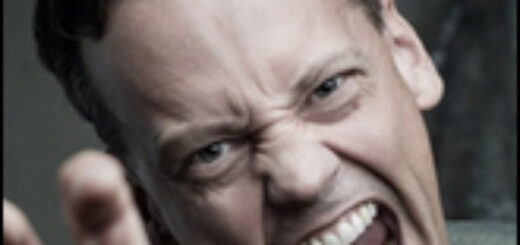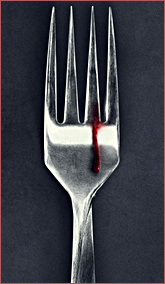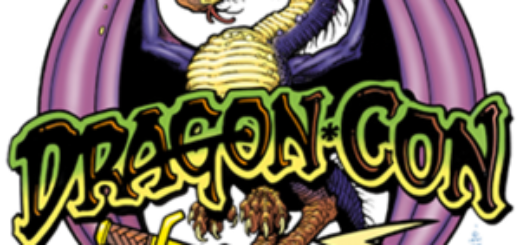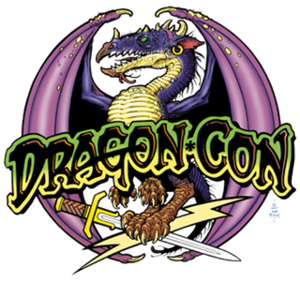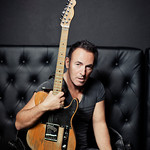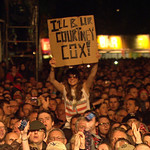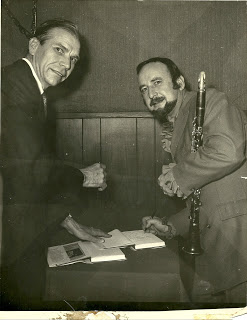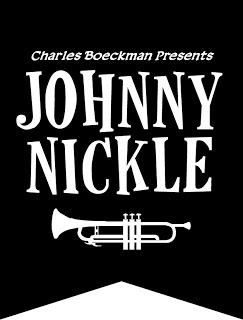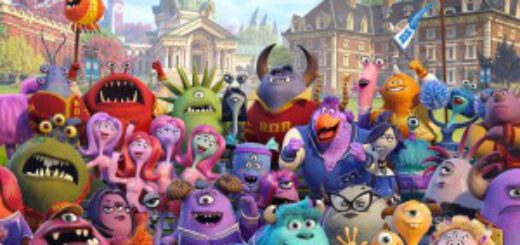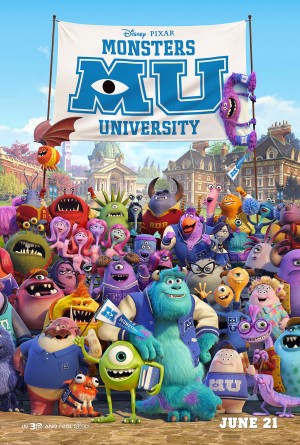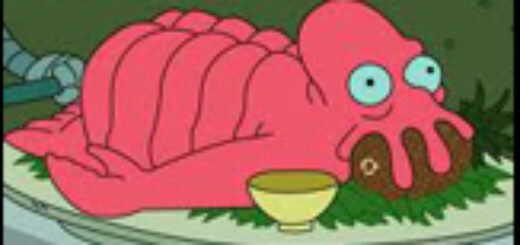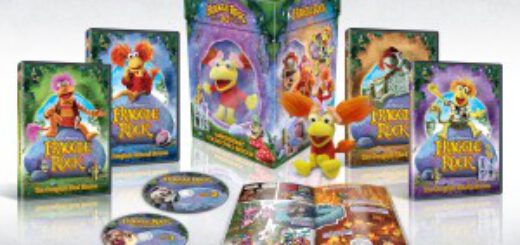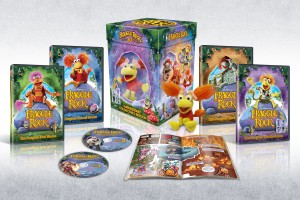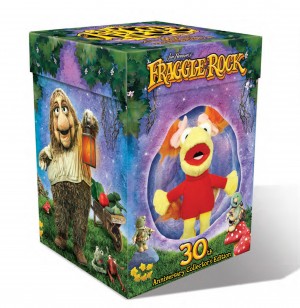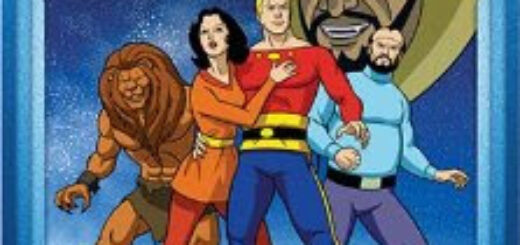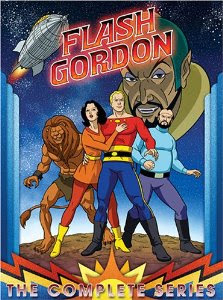Emily S. Whitten: Dee Bradley Baker is an Animal!
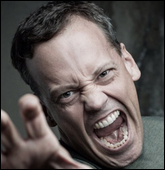 Well, actually, he’s a lot of animals. From Perry the Platypus on Phineas and Ferb to Appa and Momo on Avatar: The Last Airbender, voice actor Dee Bradley Baker is the man behind a whole slew of animal and creature sounds you might not even guess could come from a human being. Of course, he also voices awesome speaking characters, such as all of the clones on Star Wars: The Clone Wars, and Klaus the German fish on American Dad! And then there are all of those video games he’s provided voices or sounds for, like the Halo series, Portal 2, Gears of War 1 – 3, Diablo III, Left 4 Dead 2, the Ben 10 video games, and several Marvel and DC games, including Batman: Arkham City. In fact, if you look over his ridiculously long IMDB page (329 titles!) I think you’ll find that even if you are not a heavy consumer of entertainment, you’ve heard Dee’s voice somewhere and probably didn’t even know it. And that’s the way he likes it.
Well, actually, he’s a lot of animals. From Perry the Platypus on Phineas and Ferb to Appa and Momo on Avatar: The Last Airbender, voice actor Dee Bradley Baker is the man behind a whole slew of animal and creature sounds you might not even guess could come from a human being. Of course, he also voices awesome speaking characters, such as all of the clones on Star Wars: The Clone Wars, and Klaus the German fish on American Dad! And then there are all of those video games he’s provided voices or sounds for, like the Halo series, Portal 2, Gears of War 1 – 3, Diablo III, Left 4 Dead 2, the Ben 10 video games, and several Marvel and DC games, including Batman: Arkham City. In fact, if you look over his ridiculously long IMDB page (329 titles!) I think you’ll find that even if you are not a heavy consumer of entertainment, you’ve heard Dee’s voice somewhere and probably didn’t even know it. And that’s the way he likes it.
I had a chance to sit down with Dee at the San Diego Comic-Con and talk about his amazing talents, examples of which you can listen to here, and his experiences as a voice actor (and for those who are interested in getting into voice acting, I recommend Dee’s site, I Want to Be a Voice Actor, as a great resource). It was an awesome interview, which you can watch in its entirety here. Or, read on for the transcript!
You’ve worked on a number of things that are being featured here at SDCC, so please tell me about those.
My first day was a panel for I Know That Voice, which the great John DiMaggio, the voice of Bender and a ton of other voices, is overseeing; and it basically chronicles the history of voice acting and who’s working in voice acting right now – most all of the A-listers – and it also speaks a lot about Comic-Con as well. He just kind of assembled some Avengers of Voice Acting on that panel, and we had a really fun panel. I also did one for Phineas and Ferb, and that went beautifully. I’m Perry the Platypus on Phineas and Ferb (demonstrates Perry). That’s a great and creative show; and I really love that show as a dad, because that’s one you can watch over and over and over again, which is what kids like to do; so that was spectacular. Yesterday we had a big panel in the gigantic hall for American Dad!, which was also a lot of fun. (In character) I’m Klaus the fish on American Dad! And I am in a little bowl.
And what was it that Rob Paulsen said about that voice on the I Know That Voice panel?
It just makes him happy. It makes him happy to hear me speak with a German accent. Or to speak in German, which I will do for him.
It was funny to see the reactions on that panel when you started doing Klaus. I think everybody loves that.
Yes; well, I have a real fondness for the German language. I speak it, and I spent a year in school there, and I studied German writers and philosophers. And it’s just kind of a forgotten language in this country basically since the 20th century, and it’s a fun little thing to pop out and show everyone.
With the German language thing; when you go in and a director says they’re looking for a German voice do you ever do German and they say, “that’s too authentic, we want something hammy”?
No; if they want me to dial down the accent, I’ll do that; but I’ve never gotten that request. I understand what you’re asking; but actually, for me, it usually works out – what’s sometimes difficult for me is if I go in to do a dog or a cat, and they want something that doesn’t sound like a dog or a cat. They want something that’s goofy; or that’s more human. So I have to make myself bend away from something that’s authentic into something that expresses it with the tone that they want.
When you’re doing that process, do you just sit there and try a bunch of noises?
Yes.
Can you give an example?
Well, if you want, like, a dog bark (demonstrates different dog barks) you can humanize it. You can make it more Scooby, or more like a dog. And then you can dial in whether it’s small or big or whatever. But it’s a little different for every show, and that’s kind of what I do as a voice actor.
That’s great. Now you mentioned philosophy – did you study philosophy?
Yes, I was a philosophy major in college, with practically a minor in German.
So how did you go from philosophy and German to voice acting?
Both coexisted fine, really. I’ve done performing all of my life, and had a lot of fun doing everything from plays and operas and stand-up and children’s theater and improv, to singing telegrams, summer stock, Shakespeare-
Singing telegrams, really? Where do you even find that job?
Oh, just look in the Yellow Pages! Or whatever exists now. You can get money to do a live singing telegram.
Did you have to dance, too?
Well, it depends on the character. On what they want the character to do. Whether it’s like a nerd strip-a-gram, or…there are just various characters that they hand you, with this horrible script, and then you have to walk into a situation where either they’re delighted or they’re just completely mortified, and it’s really uncomfortable. And then you have to try to get them to pay you your money, because the company that hires you is not going to help you with that. It’s actually a fairly unpleasant job for me to do. So I didn’t do that for very long; but I did it for a while. But you know, it’s either that, or work in an office; and I don’t want to work in an office. So – I like performing, and I’m happy to try something stupid in front of people. I always have been, and that’s how I earn my living; is basically that.
And you’re fantastic at it, so that’s great! Now, I looked at your IMDB page. With voice actors, it’s impossible to even remotely cover everything, because you all are so versatile, and you do everything.
Yeah, a lot of us are very versatile, and do a lot of different kinds of voices; we do impressions; you know, I specialize in sounds; some are women who do little boy voices; some are known for the sexy; some are known for the powerful, or the evil, or the big; or maybe they can do them all. So yeah, a lot of us have a lot of different shows that we do. That’s how you earn a living as a voice actor, is to do a lot of shows; as opposed to on-camera, where you’re pretty much just doing one show at a time.
And as I was looking through your IMDB, I never actually got down to the bottom of your very first gig. I was scrolling, and I was like, “I’m never going to get there,” so I’ll just ask: what was your first gig, and also, what was your first experience performing in front of people, like as a child or whatever.
My first performing-in-front-of-people experience was I think in first grade, when they asked me to present flowers at the University of Northern Colorado homecoming queen beauty pageant, and I had to present flowers to the gal who was one of the homecoming queen candidates at the university. My second performance was the lead as Oliver in the play Oliver at my school, which was a K through 12 school in Greeley, Colorado, and that was my first really acting/performing gig, was starring in Oliver. I was in second grade, so about eight years old. My first professional gig, being paid, would be performing Oliver, again, at the Chuckwagon Dinner Playhouse in Greeley, Colorado. They paid me something like thirteen bucks a night to be Oliver. I was probably ten or eleven. I did Oliver in Greeley three times! I did it once at my school, once at the university, which was not paid, and then once for the Chuckwagon Dinner Playhouse, which was paid. And that was my first paying gig.
But when I was a kid, you know, I did ventriloquism; I did plays; they’d bring me over as the boy soprano at the university for Bernstein’s Mass or various productions. That was not paid; that was just for fun. That’s how I came to become enamored of acting and performing, was just doing it for fun.
So what was your first voice acting gig that was professional?
My first paid voice acting gig was doing a non-union commercial in Colorado Springs for Mexicana Airlines, in a horrible Spanish accent. That was my first voiceover gig, if I remember correctly. It was terrible. It was truly terrible, but I got paid to do not-my-voice in a commercial.
And it’s all experience, whether you’re paid or not. That’s the best teacher; that’s what you want. You need experience. Not necessarily classroom study, although that can be a very good thing. But you’ve got to get in front of an audience, and you’ve got to convince people to give you money to do what you like to do.
Now you were saying that you’re known for creatures, which I of course knew and appreciate-
(Dee does animal noises!)
So can I ask you, how do you do…
(Dee does crickets!)
…that. How do you do the crickets? I love the crickets!
(Demonstrating) The crickets are done with the back of the tongue against the soft palate, like you’re gargling; it’s very relaxed back there. You can do it other ways too, actually. You can do it in the front of the mouth. But I do it in the back of the mouth; and then while I’m whistling, I dial in the uvula; and then I whistle with an inhale, which is a higher whistle for me; and then I just do it in reverse. So that’s what you do. But you can do that! You can practice that and you can do that. I’ve shown people how to do it.
I believe you! And I love the crickets.
Everybody loves the crickets. Except for a writer. A writer doesn’t like the crickets. Because you insert the crickets when there’s a pause or when the joke falls flat. So writers don’t like the crickets; that’s one thing I’ve learned.
That makes sense. Now you do tons and tons of creatures. Have you had any particular ones that have been really difficult to come up with, or that really stressed your voice?
Well roaring and screaming like you often do in video games can be really taxing on the voice. But I try to do it in a way that doesn’t tear up my voice. That’s done by relying on – not the voice. By relying on the throat. (demonstrates) Like that – where I’m using not just my voice but other things to make the sound or the effort. It also helps too to use it on an inhale sometimes, because that can get you a lot of sound but is not as hard on the voice. It’s taxing on the voice, but not terribly so.
When you do that in public and people smile like I’m smiling now, do you get a big kick out of that?
I don’t do it in public, and when I do they don’t smile! Well, they do here! It’s gotta be set up right, otherwise, there’s something wrong. There’s something obviously wrong, and they don’t smile.
Well, I was going to ask, also, because a lot of voice actors are known for the voices that they do, what is it like being the creature guy; being a voice actor who’s most known for animal and creature sounds?
I love that. I’m happy not to be known for anything. I don’t need to be known at all; it’s not really on my agenda. It doesn’t serve my life to be known; other than professionally, in professional circles, for people to know that I do creature and animal sounds. But that’s part of the appeal of a voice acting career, is that you’re not saddled with fame. You can live a relatively normal life and have normal relationships, and have to deal with your own human limitations in a more immediate way than you do in the sort of mediated, buffered world that a famous person has to cope with. So that’s part of why I like voice acting and was drawn to it, is that in particular.
Has that changed any for you since YouTube and having voice actors at cons and things are more prevalent now?
I can still go shopping at a grocery store and nobody knows who the heck I am, so no. But! There are a couple more people at a convention that recognize me; that’s fine. But for the most part, they don’t. And that’s okay.
Okay; now with The Clone Wars, you were saying the other day that it’s strange for you to be doing a normal voice. Can you talk about that experience?
Yes, well, when you’re establishing your career in whatever you’re doing, you kind of start with your default strength, and that for me tended to be more (in character) wacky or comedic character roles, that were more broad or cartoony. And I still have that in my wheelhouse. But when I auditioned for and got on Clone Wars, (in character) it is a straight-ahead soldier; I mean that is a normal human being that is as straight-ahead as you can imagine. There’s nothing bizarre or strange about a clone. They are a soldier, and a human, and that is what is interesting about them.
And so I would never have cast myself in doing that kind of a role at that time. That was kind of a mental limitation I had imposed upon myself, just because of what I’d been doing and what worked. But that kind of opened up for me the realization that I can do normal! That I can do normal and variations of normal; and the acting challenge of applying the gradation of character to the clones really opened up my mind in terms of what I can do and how I look at what I can do. So from that, I will occasionally get a villain character. For instance, Tarrlok, in Legend of Korra. (in character) Tarrlok, he speaks mostly as I do. But he is a character who is duplicitous, and you’re not always sure what he’s going to do; if he’s friendly, or if he’s evil…or what’s up with him. And that was another just straight-ahead character; who was kind of unsavory in a lot of ways. But again, I got to do that. Or Ra’s al Ghul in the Batman: Arkham City video game. I mean, that’s a straight-ahead villain. That’s a heavy. And I booked that, whereas I think a decade ago or so, I don’t think I would have even auditioned for it. No one would have thought to, and I wouldn’t have thought to. I would have said, “Nah, that’s not really what I do.”
You’ve worked a lot in both video games and animation. What’s the difference in experiences there? Do you prefer one?
I like video games in general because I think it’s not just an art form, but an evolution in how humans communicate, and what they do. I don’t think normal society really understands that. The sort of established, grown-up society; I don’t think they understand the profundity of what that means in terms of connecting with millions of other people in different countries and doing something together. Like, with World of Warcraft, or on Xbox or something like that, you’re literally playing against the rest of the planet, or you’re playing with them, as you play against them. It’s competitive but at the same time it’s cooperative. And I don’t know what else we’re doing as nations and countries that is like that. I think it’s a really positive and necessary thing, that has the potential to lead to kind of benevolent connections among societies; that we need, as the world seems to be falling apart. I think it’s a thing that brings large groups of people together, who don’t even necessarily speak the same language. And that’s something; that’s unique.
It also brings in a lot of different art forms in addition to writing and acting. It also puts music into the ear of young people who probably aren’t getting that; because arts and other essential education in this country are being cut, because education is not a priority in this country, sadly. Tragically. And so I like that it brings music into the mind and into the ear; as many of the projects that we have here at Comic-Con do. Whether it’s the X-Men feature film, or a Halo game, the music that you’re hearing, this sort of nineteenth century programmatic music, is really marvelous. It’s a marvelous form of expression. We should know it and appreciate it and cultivate that in our world, I think.
I agree. Now speaking of the con again, were you also doing Wolves?
Yes, I did! I was doing wolf sounds for Wolves. I don’t know what I am allowed to tell about it, but it’s David Hayter’s project, and he’s got a great werewolf-type project, and they brought me in to do some wolves. (demonstrates)
That’s fantastic. Are there any other new projects we should be keeping an eye out for?
I wish there were more that I could talk about. I continue to do a lot of stuff for Disney, and for Phineas and Ferb, and Jake and the Never Land Pirates, and lots of shows that kids really like. For Jake and the Never Land Pirates, I’m the Croc, and – I’m pretty much the animals in that; whether it’s a bee or a plant or a lizard or a bug or whatever it is, they call me in to do that.
What does it make you feel like if you’re watching a show that you’ve done, and there are people talking, and you are all of the background noises or whatever?
I like that. I mean, it’s fun! It’s fun to be in there, and I like it best if people don’t realize that that’s what that is; that there is a human doing that. The goal would be for it to sound natural and seamless and invisible, sort of like a special effect. You don’t want an audience member to think about a special effect. You want them to experience the scene more accurately to what your vision is as a creator. And that’s what I want to be as a voice actor who adds the weird or the animal or the alien, is to make it feel like this is an organic part of what the story is. Not, “Oh, who’s that guy, doing that sound?” That’s what I don’t want.
I think you succeed very well, because I would never know.
• • • • •
Dee is a such pleasure to talk with, and I had a fantastic time interviewing him! And, of course, I asked Dee to do a shout-out for ComicMix, which he was kind enough to do. Don’t miss it at the end of the video!
And until next time, Servo Lectio!
TUESDAY AFTERNOON: Michael Davis Goes Super Nigga!
WEDNESDAY MORNING: Mike Gold Gets Real Small

